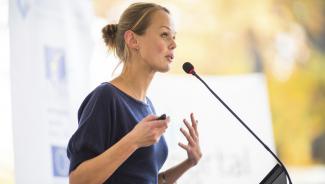
Look at these examples to see how we use inversion after negative adverbials.
Never have I been so happy to see someone.
Not only did he win the match but he came back from a difficult start.
Barely had she got back in bed when her alarm went off.
Try this exercise to test your grammar.
- Grammar test 1
Read the explanation to learn more.
Grammar explanation
'Inversion' means reversing (inverting) the normal subject–verb word order in a sentence.
We can use inversion to add emphasis, especially in formal English. It is common, for example, in political speeches, because it has a persuasive and impressive effect.
To invert a sentence in this way, we put the adverbial (e.g. never, rarely, not only, etc.) at the beginning and change the normal position of the subject and the auxiliary verb.
Not only did they arrive late but they talked throughout the film.
(They not only arrived late but they talked throughout the film.)
If there is no auxiliary verb, we need to add one. For example, we add do for present simple verbs and did for past simple verbs.
Rarely do we find such talent.
(We rarely find such talent.)
Never, rarely, seldom
These adverbials are often used with present perfect, past perfect or modals like can and could.
Never had they seen so many people in the village.
Seldom has she taken a day off work.
Rarely can a patient fully recover from such an injury.
Hardly, barely, scarcely, no sooner
These adverbials often refer to an event which quickly follows another in the past and are usually used with past perfect. Hardly, scarcely and barely are followed by when in the contrasting clause, and no sooner is followed by than.
Hardly had we sat down when we were told to evacuate the building.
Scarcely had the votes been counted when the new president was pushed in front of TV cameras.
No sooner had the game started than the captain was taken ill.
No sooner was the new park open than it started raining.
Only + time expression
These include only after, only if/when, only then and only later.
Only when they refilled my glass did I realise it was broken.
Only later did they discover they hadn't been told the truth.
Phrases with no and not
These include under no circumstances, on no account, at no time, in no way, on no condition, not until and not only.
Under no circumstances should children travel without an adult.
In no way did we agree to this.
Little
In these sentences, little has a negative or restrictive meaning.
Little do people realise how hard it is to be a chef.
(People don't realise how hard it is to be a chef.)
Little did she know then that she would become the company director.
(She didn't know then that she would become the company director.)
Do this exercise to test your grammar again.
- Grammar test 2




Hi Teachers,
I would like this sentence "they assume that never would their grip on Algeria was secure if they did not hold it", why the word "was" here was wrong after negative adverb inversion and what should replace it ? thank you
Hello
I have a doubt with these sentences, are they well written? do they mean the same?:
Thank you
Hello danielcanton,
Yes, both of those sentences are correct. Well done!
The meanings are similar but the first (with should) gives strong advice whereas the second (with allowed to) describes a prohibition or rule.
Peter
The LearnEnglish Team
Hello teachers,
Is the following structure in present simple correct?
No sooner do I try falling asleep than somebody calls me.
Thank you in advance!
Hello khrysty7na,
Yes, that's correct. It describes (complains about) a frequent or repeated situation.
Well done.
Peter
The LearnEnglish Team
Hello there!
I have a question about sentence 5 grammar test 1.
Could you explain me please why shouldn't we use an inversion in this sentence like in the others.
"Only when had we heard they'd arrived safely could we relax"
Thank you!
Hi LikTo,
There is inversion in this sentence but it is later:
Could we is the inverted part here. I think the confusion comes from how long the introductory clause is. If you replace it with something shorter (like a single word!) then the construction becomes clear:
You don't need any inversion in the introductory clause, only in the main clause.
Peter
The LearnEnglish Team
Hi teachers,
Thank you for the handy information. I have some confusion about the topic. Could you give me some advice?
As in Grammar Test 1 no. 5, the question says:
We couldn't relax until we heard they'd arrived safely.
While simple past tense is used in the question, the model answer involves the use of past perfect tense.
Can it also be 'Only when we heard they'd arrived safely could we relax'?
Is past perfect tense necessary in this case? Or is simple past tense acceptable?
Hello kitmit831,
Since the instructions in the exercise specify that three words must be used, the answer must be in the past perfect.
But you are right: in real life, the past simple is also acceptable in this case :-)
Sorry for the confusion!
Best wishes,
Kirk
LearnEnglish team
Hello teachers,
I found this sentence on news 'Showing me around the long, brightly lit corridors lined with rows of shuttered metal doors is David Allan. '
Is this structure using inversion? Why?
I don't find the reason why this is using inversion?